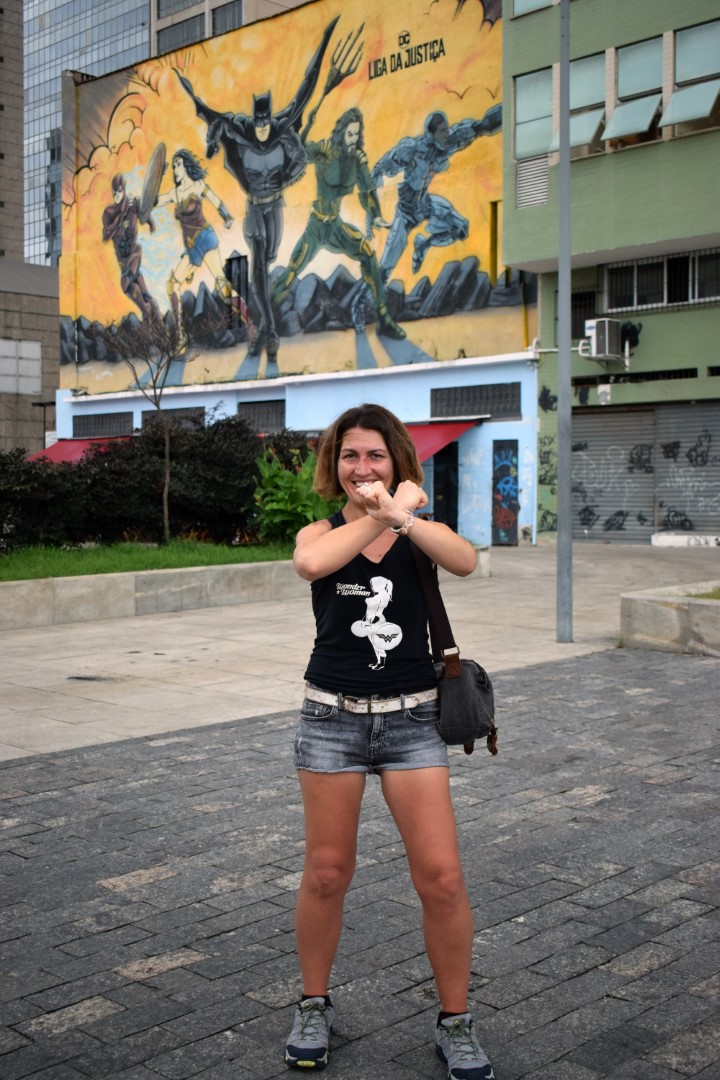The first few days or weeks of travelling are exciting but not so glamorous. No matter how hard you try, you stand out with your pale skin and rusty language skills. It’s basically like being the mid-term new kid in class—the only way to survive is to learn how to fit in.
Brazil is a rewarding country, but a challenging one. It took us several trips to pick up some Portuguese, understand the mindset, and solve a few “Brazilian mysteries”, i.e. find answers to puzzling cultural questions.
We’ve learned a few lessons from past mistakes and this year, everything went smoothly. We managed to withdraw cash from ATMs (tips—stay away from Itaú, Bradesco handles foreign cards well, go before major holidays otherwise ATMs are empty). We booked a hotel that doesn’t suck in Rio de Janeiro (tip—avoid Copacabana). We didn’t starve on New Year’s Day (tip—everything is closed, plan ahead). Hell, people even occasionally understand me when I speak Portuguese!
We thought we had it all figured out and we were so confident that we decided to get two Brazilian SIM cards and prepaid minutes/data with Claro, Oi, Tim or Vivo for convenience.
We both brought our cellphones—Feng uses it as a camera, I use it as a media player. But hey, we could also like… use them as phones?
We’re not phone people. I’d much rather write an email than make a call and I have a complicated relationship with a device probably smarter than me. Feng is the same. Yet, last summer, we both bought French SIM cards for our Canadian phones and it did make our lives easier to answer the top question in the 21st century—“where are you?”
Besides, last year, I felt like an outcast in Latin America without a phone. “Get a Uber ride!” “Ahem… I don’t have a phone.” “What’s your Whatsapp?” “I… can’t download the desktop version.” “Can you text to confirm arrival time?” “I DON’T HAVE A FUCKING PHONE!” I’m pretty sure Chile, Argentina, Uruguay and Brazil think Canada is a backward country because of me. Sorry, eh.
We didn’t stay long enough in Peru and Chile to get a SIM card, we were only planning to buy it for Brazil, the land of megalopolises, unexpected torrential downpours, endless beaches and other challenges that can make meeting at said place and time tricky.
When we arrived in São Paulo, I went to a Claro store on Avenida Paulista and asked about pre-paid cards. “Yeah, we do that… we just don’t sell them at this store.”
No worries. The following day, I went to another Claro store at the Shopping Cidade São Paulo while the guys were eating at the food court. They had SIM and pre-paid cards but I had to bring my passport.
“I don’t have it with me, but I’ll come back tomorrow.”
“Não.”
“No?”
“We’re closed on the 31.”
“Ah.”
And the store was also closed on January 1, so we left São Paulo without SIM cards.
In Rio de Janeiro, there was a Claro store inside the supermarket by the hotel, but it was one of these stores without pre-paid cards. However, there was another Claro store at Botafogo Praia Shopping, so we brought our phones, Canadian passports and more reais than usual to complete the transaction.
Guess what—this Claro store didn’t sell them either. Never mind, we went to Vivo, next door. No problem, they had pre-paid cards and they could sell us a SIM card. It was 112 reais for a chip and some data.
“Perfect! And how many minutes do we get?”
“Minutes?”
“Yeah, minutes. Crédito para falar… para fazer ligação.”
“No minutes.”
“Okay, so how do we buy minutes?”
“You can’t. It’s a data only card.”
I translated for Feng.
“But… but it’s a phone! We want to use it to make calls!”
I translated for the Vivo employee.
She shrugged.
“No minutes.”
We sighed and went to the Tim store. Yes, they had pre-paid cards. Yes, we had our passports. Phew.
“Ahem… minutes are included, right?”
“No, you need a CPF to buy minutes.”
I immediately knew what he was talking about. This is probably the only Brazilian initialism I know—CPF, Cadastro de Pessoas Físicas, i.e. some kind of individual taxpayer registry identification. A bit like the Canadian Social Insurance Number, I guess.
When you buy something in Brazil—anything, a bottle of water or a new car—you basically have to say “no” twice before paying. First question is “CPF?”, which means that you can register your CPF with the purchase. Second question is whether you want a receipt. You may say “yes” to the third question, “sacolinha,” if you need a bag.
“Caypayfay?”
“Não.”
Repeat twenty times a day.
It’s the same in Chile where cashiers ask for your RUT, the local equivalent of the CPF. I solved that mystery a few trips ago, even though it’s still weird for me that locals keep on giving out the number we’re told not to share in Canada.
“So wait… you need a CPF to buy a pre-paid card?”
“If you want a phone number and minutes, yes.”
Damn.
We asked several cellphone providers and even the bancas de jornal (newsagents) where you can reload your pre-paid card. There’s no way around it, CPF or just data, which is pretty useless for us. I know, we could use Whatsapp or Skype, but then may as well use free Wi-Fi.
So this is my new Brazilian mystery. Why do you need a CPF to buy cellphone cards with minutes?
I’m sure I’ll get a logical explanation at one point—one that will make complete sense to Brazilians and none to me.





There is no logical explanation why transactions in Brazil are so complicated… Having your CPF (see-pee-ayfee) memorized to go to the supermarket is only the top of the iceberg. If you try to buy a towel in a big store, then you have to open a “cadastro”, register your name, your address, email address, cell phone (and if you don’t have one like me, you give your home phone, but that not enough, they don’t know what to do with it), email and blood of your last born (almost). And you have to queue to open the cadastro, and queue again at the cashier to pay. Happens to pay bills too. It’s a daily nightmare. I’m still traumatized.
Oh yes, the bloody “cadastre-se”! I went to get my legs waxed yesterday, and the first thing asked was “documentos”. Ahem… do I need to provide a fucking government ID for that??? It feels so weird to me!
Chile does the same with the RUT. I can’t remember Argentina having a similar system…?
Say-Pay-effe (F*)? 😆
😆 I can’t unhear that!
Me again, I ran into this same issue. I tried Vivo, got the chip for like $R10.00 at some mall store in San Bernardo where I’m staying, but was told I could get one from Claro! – and yes that CPF number was required for my phone to have voicemail, SMS text and to call. All I have is data also, I use WhatsApp and tried installing Uber but it requires a phone number which I have but just can’t use; because the Uber app sends a code to your cell number (a two factor) verification of sorts.
Annoying; but I’m only here for a week. I’m jealous of your long trips…but like reading your blog.
Two-factor authentification is the bane of my (on-the-road) existence. I’m still fighting with my Canadian bank who decided I couldn’t transfer money to myself because I can’t enter a fucking code they want to send to my Canadian number…
Where are you from, by the way? And what brought you to Brazil?
…@Zhu, hi, I’m from Massachusetts. Sorry, didn’t get your reply notification, but did get your next article. (Time to get out of dodge) haha. Your descriptions are pretty spot on. I haven’t really spent much time in São Paulo itself, I’ve mainly been in São Bernardo (San Bernardo) to your south I think, but who can tell what isn’t São Paulo, as it kind of blends into each other it seem. I’m from mostly the sparsely populated areas of New England, never a city boy. So it’s quite eye opening, walk up on the 14th floor and look out as far as the eye can see and you see densely packed buildings next to each other, peppered with houses, underdeveloped projects and infrastructure that needs some civil engineering housekeeping and on the outskirts the favelas. Street venders, motorbikes and mopeds splitting lanes often and dangerously close to peeling paint or skin, jaywalking and red light running.
Just wow.
Oh, walk without flashy jewelry, don’t dress like a tourist alone, don’t have your phone out often and get back inside before dark if you are walking the sidewalks to get anywhere besides the mall.
But….. I digress, I’m here to meet a friend I met online on a language exchange App, called HelloTalk. She already had one visitor from New Jersey come down to visit two years ago and now are good online buddies and was offered a similar experience in return when she visits New Jersey, I’m guessing she will actually be taken to New York City – because I myself don’t know what’s in New Jersey – but I’ve driven through it.
I’ll do the same for Boston, when she comes. Though I think you could fit all of Boston inside just San Bernardo and the still have room to put a few boroughs of New York City to boot.
She connected me on my first day with a normal / private cab driver. He took me everywhere I wanted to go, on the cheap. He even stayed and waited at the zoo until we were done, flat fee. Accompanied me to the beach and Liberdade – which meant he parked and walked by my side from shop to shop or store to store and beach to beach. I don’t think I could find any cabbie in New England who would get out of his cab other than dump your luggage or if the tip was too cheap to his liking and bark at you.
Safe travels, I leave today for Florida also to visit and surprise my parents.
You must be in Florida now, so I hope you had a good trip and that your parents had a nice surprise!
I can imagine how… different Sao Paulo must have been for you. I’m a city girl, but let’s face it, absolutely no French (or Canadian, ah ah!) city can compare to Sao Paulo in terms of size and superficy. This is a city on steroid. Amazing introduction to Brazil, though, although maybe too fast. I hated Brazil the first few times I traveled there, everything was too different and complicated. Then I got into it and now I love it. It’s like China, it’s the kind of place where you have to learn how to fit in just enough to survive.
How did things go with your friend? Was it weird to fly halfway through the world (okay, maybe not that far, but far!) to meet someone?
@Zhu
…well, yes my mom was shocked I walk in the door and both parent thrilled to see me. That kind of family personal love is hard to come by; they love south, I live north and travel 80% of time for work – so it was perfect, and on their wedding anniversary 54 years, a small milestone.
As far as meeting someone 1/3 of way around the globe isn’t as weird as it may have been years ago before internet, Skype style video apps, and any other form of software for communication. It makes the world small, but nothing on the internet no matter how big your screen, how many pixel LEDs screens you have, can replace actually making that leap of faith and just do it – go forth, explore and experience it in person using all your senses.
I think it’s an eye opener and refreshes an inner spirit that needed a breath after breathing the same stale air..
Always good to make friends across the globe.
It’s always been a fantasy of mine, a surprise visit to my family! It’s cute how close you sound to your parents. Great move, I’m sure you made their day (and month, and more).
I don’t think it’s weird to travel to meet an Internet friend in person and you’re right, this is sometimes the right thing to do. You sound open minded and eager to live new experiences 🙂
Where do you travel most for work? International or US?
@Zhu You are one brave soul, I don’t think I’d be able to go where you’ve been. I think I’d have traces of yellow in my socks.
The taxi prices seem high, though I managed to keep the same Taxi driver and was given a discount and courtesy of accompaniment during my travels in out of the city and at the end of my trip to the airport. Not many taxi drivers will leave their vehicles, interpret for you as best they can, walk with you through the city and park and wait for you at the beach, zoo and museum.. for a nominal fee. (5 hours was $R195) I think he was just being friendly and wanted to make friends. Also I think Uber is taking away from their livelihood so any fare discount, courtesy – ensures a repeat customer.
As far as where I travel: I’m limited to where work sends me, but Ireland, Israel, Arizona, Oregon and sometime Japan. We also have a European team who does the rest of Europe and the Asian countries beyond Japan. I think they get more culture diversity.
It was a smart move, probably the most practical way for you to get around given that you had limited time and it was a first trip to Brazil 😉
Hi! I’m Brazilian and I can actually explain why the CPF and phone number entanglement started.
So, gangs had easy access to phones and it became an issue to have them having contact with the outside world (cell phone blockers are usually only implemented in maximum security prisons). From fake phone calls in the middle of the night saying your son or daughter had been kidnapped and they wanted ransom money to other bizarre phone crimes.
They started requiring that every SIM was attached to a CPF so they could track it and verify it.
And this is how this came to be. I’m not sure how effective it was but now you know. It’s mostly for backtracking purposes and to keep people from buying the equivalent of “burner” phones.
Also, that was a lot of money for just data, what a rip-off!
Aaaah! This actually makes sense in context!
Cellphone use in jail is also an issue in France as far as I know and “burner phones” are also used in Europe and North America. But people value their privacy so much in Canada, for instance, that there’s no way a phone could be attached to what is basically your social insurance number.
Do Brazilians get something out of giving out their CPF when buying groceries, for instance?
(Sorry, now I’m going to ask you to solve all my Brazilian mysteries!!!)
I feel so bad! I was trying to figure out what showed up when I googled myself and I came back to this post and I just saw your reply. I feel so bad!
So, it’s usually the identifier for rewards points and whatnot, kinda like here in the US you use your phone number for everything.
And I am here for all your Brazil-related questions! And hopefully this time around it won’t take 2 years for me to reply
Oh please, don’t feel bad! I also try to follow up on comments I make on other blogs, but sometimes, I forget…!
I’m sure I will have other questions eventually 😉
[…] aspects of Brazil are still a mystery to me—which is what makes it so interesting—but I’m able to decipher a few clues by […]